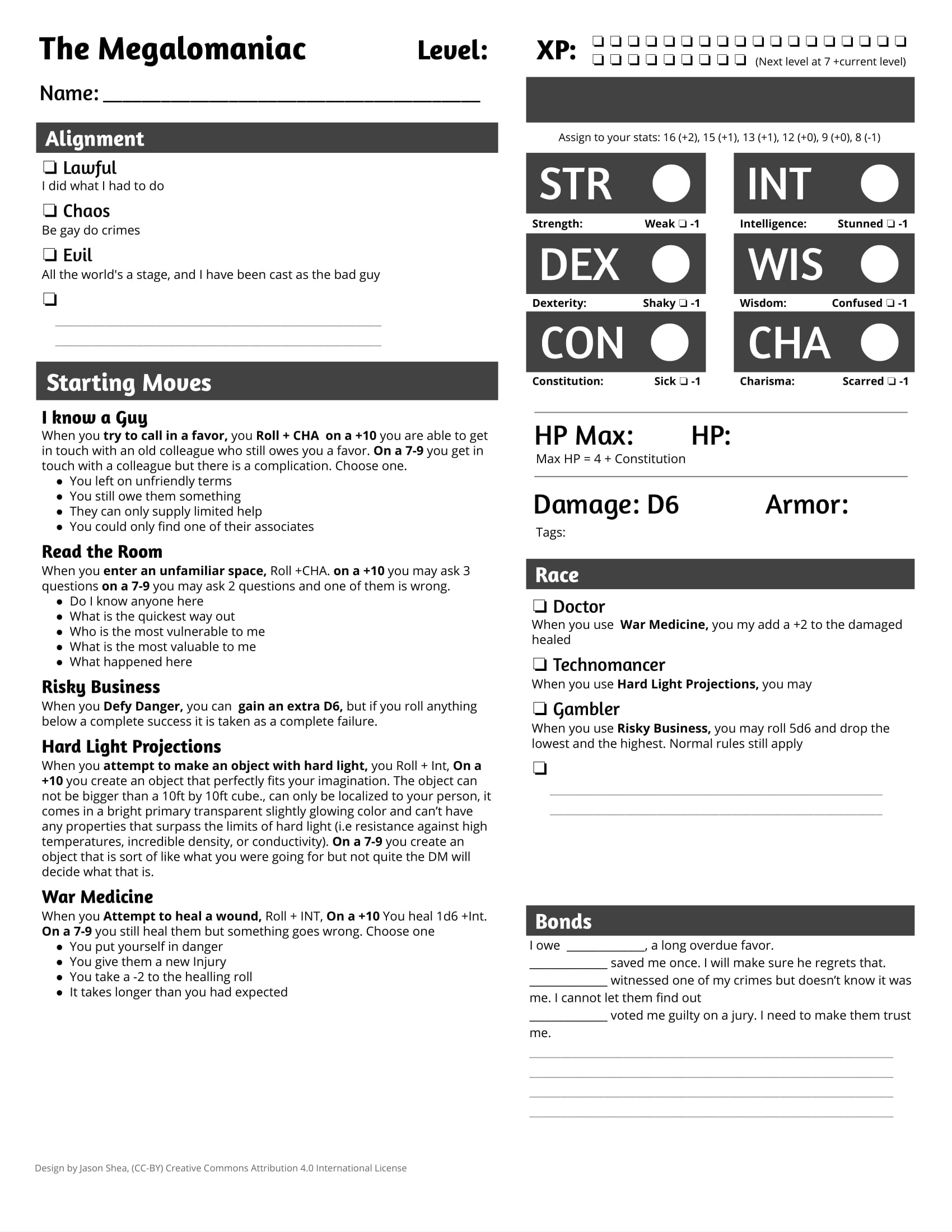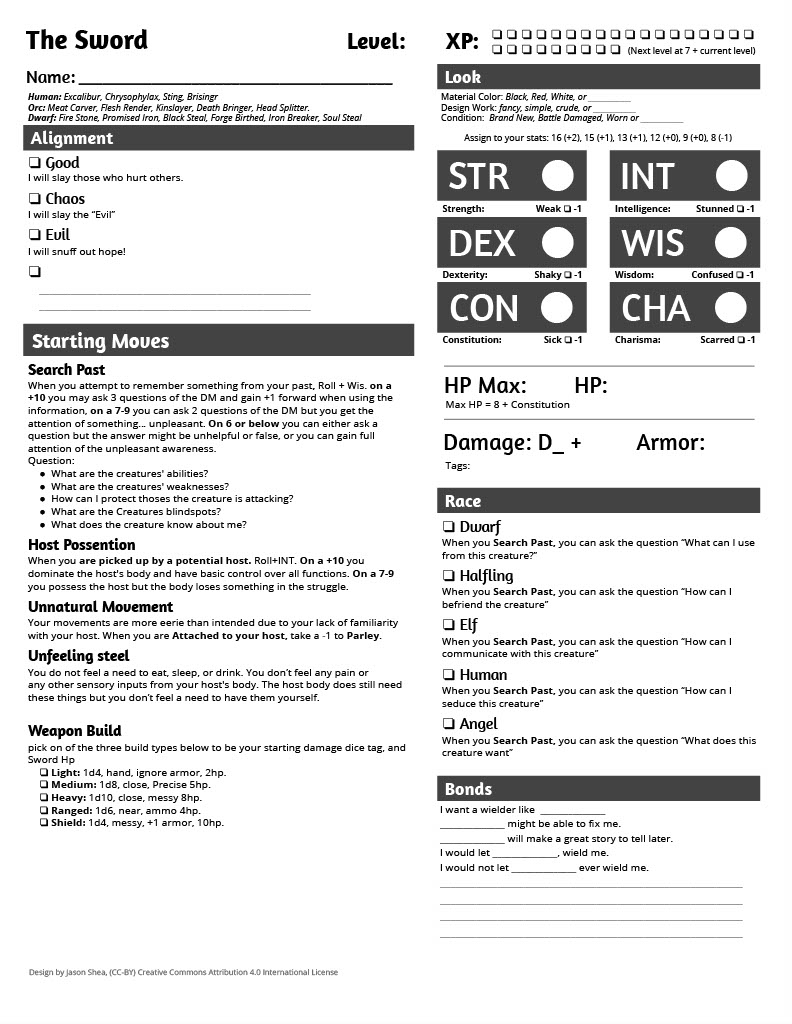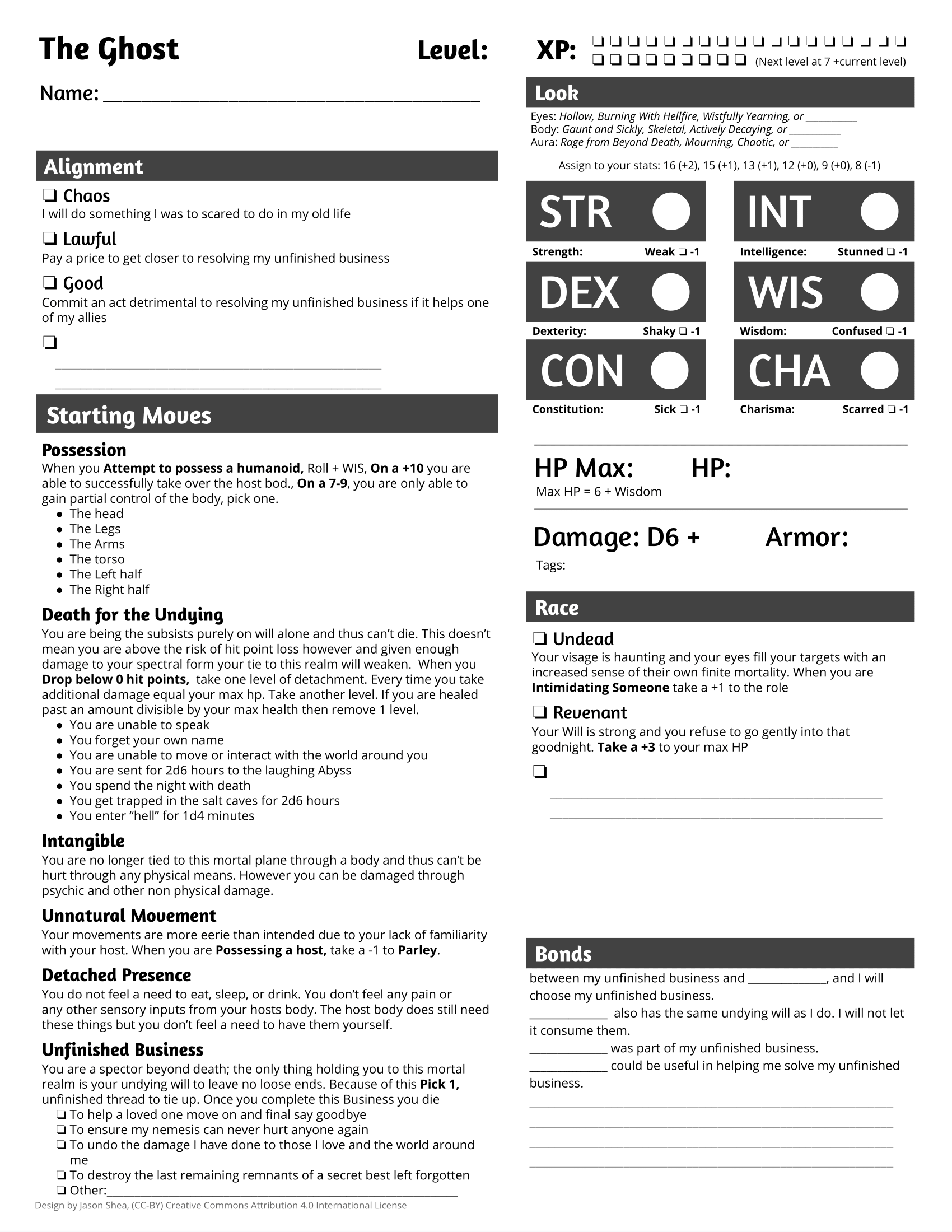Dungeon World Hacks
Solo Project
Introduction
Dungeon World is a game system that inherited a lot of its design philosophy from Powered by the Apocalypse (PbtA). The core gameplay loop of Dungeon World and PbtA is a system where the player is presented with a challenge, and they roll 2d6 + any applicable modifiers. If they roll a 10 or above (abbreviated to +10), the action they take works perfectly. If they roll between a 7 and 9 (abbreviated to 7-9), the action succeeds but not fully; something goes wrong or the player has to pay a price. If they roll below a 6 (abbreviated to -6), the action fails and the Game Master (GM) decides the consequences.
The Megalomaniac
Player Fantasy
For this playbook, my player wanted to play a suave criminal mastermind/trickster who was also a doctor and had a cybernetic in their brain that would let them create hard light copies of objects (akin to the green lantern). Suffice it to say, this one was my most tailored playbook, designed only to fit this one very specific archetype.
Design
As explained above, this playbook is split into 3 main ideas: the trickster mastermind, the doctor, and the hard light projectionist.
- The doctor is the one that has the least influence in the playbook, only being expressed in moves like “War Medicine”, “Deaths Bane”, and “You might feel a slight pinch”. When making the playbook, I knew the doctor aspect of the character needed to be part of the mechanics, because a character who is a trained medical professional needs a mechanic that allows them to heal others.
- The Hard light projectionist was the hardest fantasy to implement well, mechanically. The move “Hard Light Projections” took heavy inspiration from the Green Lanterns’ powers and from Loki’s magic. When designing the mechanic, I wanted the player to be able to create anything they wanted (within reason), and those creations to be able to have an effect on gameplay. The difficulty with this design is if the move affects gameplay, I need to be specific on how those effects work mechanically. But, this restricts the player’s creativity in creating interesting and unique solutions to in-game problems.
A way to accommodate this mechanic, was to focus more on the hard light projectionist fantasy. Instead of having one move that tries to encapsulate everything, make many moves that each encapsulates a singular aspect of the hard light projectionist fantasy.
- The last and most in-depth fantasy I explored was the trickster/criminal mastermind. The titular megalomaniac, if you will. This one was the most interesting to me because I personally love playing the silver-tongued liar who is flying by the seat of his pants. Think of someone like Jack Sparrow, Loki, or The Doctor. When looking at these characters for inspiration, I realized their strengths were in collecting information about situations very quickly. This is why there are a lot of moves such as “What Do You Want”, “Who Am I ?!?”, and “Read the Room” that let the player gather useful information, as they plan on how they are going to lie, cheat, or steal their way out of their current predicament.
Results
When this playbook was implemented, there were a few unexpected rough patches. The most unexpected problem was with the move “B || !B” which originally gave them a +1 to their charisma role for every 30 seconds they could keep up a monologue. Now, 30 seconds feels like a really long time, but when you are talking about monologues, a player could routinely get a +5 or +6 making it impossible to fail the roll. This means the player would always be successful in getting the person they are talking to do what they want. Letting the player rack up a crazy bonus like this just wasn’t fun. In the end, I increased the time it takes to get a +1 to 60 seconds. This incentivized the player monologuing, while still retaining that tension that they might not succeed.
The Sword
Player Fantasy
One day, my player came up to me and said “Hey, Roy, can I play a living sword who has seen a thousand battles over a hundred lifetimes and is now trapped in the body of a physically weak person?” Like the good GM I am, I said “yes, but…” and thus this playbook was born.
Design
Designing these playbooks is always tricky because neither the player nor I really know what moves should be in the playbook. They give me the generalized fantasy of being a sentient sword, but due to the collaborative nature of TTRPGs, a player never really knows what kind of character they are going to play until they start playing. Player fantasy needs to inform the mechanics of the playbook; it determines how the player can interact with the world. It wouldn’t make sense for a silver-tongued negotiator to only have combat moves.
In order to get around this uncertainty, I decided to design this playbook to be as generalized as possible. Going even more general than the intended fantasy of “sentient sword” and turning it into “sentient weapon”. This generalization gave me the ability to give the player more interesting choices that they might not have considered before. For example, there are options in the playbook that let the player play not only as a sword but also as pretty much any melee weapon, shield, or even a bow. Likewise, all the moves that modify the player’s weapon in some way (i.e. Body Modification and Master Modification) are designed to also work with whatever weapon the player has chosen.
Results
Once this playbook was finally implemented, there were a few aspects that my player didn’t use, such as their ability to possess a host (mainly because of the questionable ethics in overriding the host’s freewill). Also when asked, the player said they would have liked to have seen more moves related to combat and/or related to past events the sword would have been a part of. For instance, when you first stumble upon a town where the sword has been before, the player rolls (+CHA) — for +10 they love you, for 7-9 they remember you, and for -6 they hate you.
The Ghost
Player Fantasy
This playbook appeared out of necessity when my player made a deal with a demon. In return for freeing the demon, they wanted to be turned into a Ghost. Long story short, the demon tried to kill them, the cleric stepped in, and we ended the session with the player’s soul being tied to a gemstone. And I was left to figure out what the fallout from that situation would be.
Design
When my player told me they wanted to be a ghost, I decided to bring in the revenant — a ghostly being too angry to die, who is held to this mortal plane by their own determination and will of steel. I portray this fantasy in moves like “Unfinished Business” and “Death for the Undying”, and “Sword of WillPower”.
“Death for the Undying” is probably my most creative mechanical representation of this fantasy. There is no way to kill a ghost. The only thing you can do to them is weaken their grip on the mortal plane. Every time they would “die”, they would just lose another aspect of their self or get drawn closer to the infinite abyss, but they would never truly die.
In keeping with the theme of self, there are a lot of moves in this playbook that rely heavily on my playstyle as a GM and some of the more esoteric parts of the campaign setting. A great example of this would be “The Midnight Train”, and any of the moves where the astral visage is brought up, such as “The Pale Face of Death”. The Midnight Train” move would let
me spark these huge odysseys, spanning across the ethereal realm with vivid details. Most of that imagery is from my own enjoyment of improving dream sequences for characters; the ethereal realm is nothing but a huge dream sequence in my world. But, I think moves like “The Midnight Train” are very interesting if the GM is open to it. They can really lean hard into the role play and create cool sequences from a single move.
Results
When this playbook was implemented, there was a design flaw I didn’t catch. Most of the moves for the playbook are reliant on Wisdom as their primary stat, as the player levels up, they can pour everything into that stat and become pretty much unstoppable. Going back, I would diversify and make more moves requiring different stats like Constitution or Intelligence.



